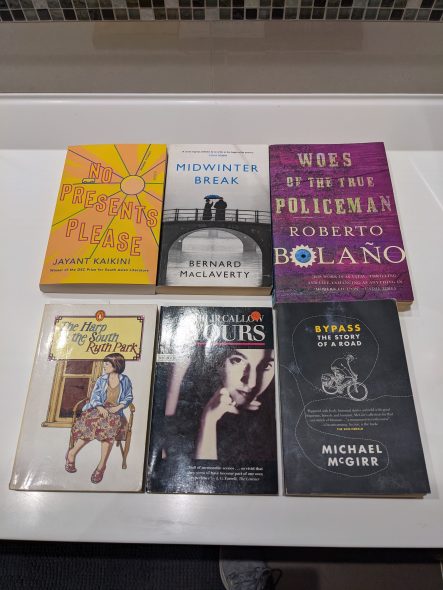
I went through a huge Indian phase in the late 90s – maybe all the Western world did; authors like Rohinton Mistry, Kiran Desai, Arunhdati Roy and Vikram Seth were high on the bestseller lists and somewhat romanticised Indian life. Maybe it was just me, but it seems like folks then moved on to other fertile ground – that of Africa or Indonesia and African American stuff. I never did get to India in my travels but once in awhile I like to breath it in again, as I did with No Presents Please by Jayant Kaikini, a book I bought as much for the joyous cover as I did for the writing. The stories of ordinary life in Mumbai were patchy and uneven (it seemed to me) – some of the earlier ones were more loaded with conventional twists and satisfying unpredictable endings, and then others went nowhere or told a point that was lost on me. Still, enjoyable – 3.5 stars.
Midwinter Break by Bernard MacLaverty had been on my wishlist for awhile – Kim found it in an Op Shop by chance, so I was thrilled to get it during this COVID period where I’d not visited a book shop in 18 months it seemed. It can’t be just me that seeks fictional themes that reflect the phase of life you’re in, or will shortly be in and this one promised t deliver. A long married, retired Irish couple go on a long weekend to Amsterdam, where their domestic routines and familiarity with each other provokes reactions and decisions. The woman is found to have suggested the trip so she can explore a future religious life of spartan purity – one that her husband has no part in. The husband, an increasingly doddery drunk, surprisingly understands and continues to do thoughtful things for his wife despite this betrayal. Hopes are dashed and I was left with a gentle, sympathetic portrait of a couple who’ve drifted far apart but who remain grateful for each other when there is nothing left. 4 stars.
This one, Woes of the True Policeman by Roberto Bolano is a such an unbalanced, frustrating read, though all his books could be described that way, but when the author died midway through revising it in 2000, it was always going to attract someone wanting to compile the scraps and background research into a commercial product. Large chunks of this are extremely readable – the story of an older passionate gay man who has sex with his students and is eventually hounded out of Spanish academia to Mexico, where he tries to rebuilt his life, only to find new temptations. There are many short chapters in the midst of this final unfinished novel dedicated to topics such as Sworn Enemies of Arcimboldi (a fictional writer) – and then a list of names of fictional people, and chapters with synopses of fictional books he had written. WTF! haha. I skipped some of those bits, but the remainder was typically compelling and dangerous, and Bolano has to be read at least once for the mildly traumatic exposure to his crazy excesses. 3.5 stars.
The Harp in the South by Ruth Park is set in inner Sydney around the 1930s I think, in a very poor neighbourhood of immigrants all trying to get on in life amidst the violence of the streets – car accidents, drunken sailor fights, illegal betting and backyard abortionists – you name it, it’s happening. For me, is was father Hughie Darcy, a flawed and simple man, who provided the highlights of this sympathetic Darcy family novel, which brought to mind The Grapes of Wrath or My Brother Jack. The scenes where the family interact with their lodgers spinster Ms Sheily and Protestant Mr. Diamond are particularly spiteful and amusing. The coming of age story of innocent Roie Darcy is the drawcard and theme, but the bit players and glimpses into everyday life are eye opening and make for a terrific read. 4 stars.
I had no idea how uncommon Yours by Philip Callow was until I noticed only a single review on GoodReads, but the reviews on the cover were convincing, as was the $1 price tag. What a unique and mostly gripping read. Precise and unsettling, a young working class woman ventures into the adult world in the early 1960s to observe and brutally judge her peers for their flaws. There’s a lovely period feel about it (published in 1972), though I’m not convinced it’s a particularly good example of a man writing as a woman. I’d read him again for sure – 4 stars.
Picking up Bypass – The Story of a Road by Michael McGirr, I’d prepared myself for a slog, since A: It was Australian, B: It contained quite a bit of history, C: The main theme was the dull Hume Highway. I was regularly surprised by the freshness of the prose and the candour of the author, a former priest on a redemptive bicycle ride down the Hume from Sydney to Melbourne, partly shared with his future wife-to-be. The historical asides (Hume vs. Hovell) were short, witty and not too indulgent, and the modern day stories of the highway (trucking strike of 1978, Cliff Young ultramarathon, etc..) were interesting and varied. It was beautifully balanced, researched and funny I thought. How is this so poorly rated on Goodreads? 4 stars.